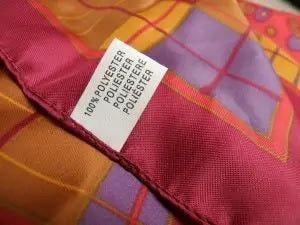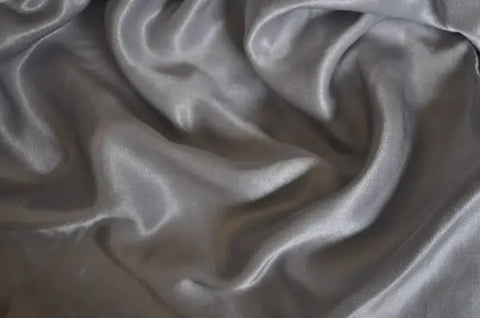Different Types of Indian Fabrics With Pictures
Many types of fabrics are worn in India like Cotton, Silk, Linen, Denim, etc. While it is great to wear the fashion clothing making a style statement but let us also understand the details of the fabric used with images. They vary based on natural or synthetic fibers.
What are different types of fabrics made from Natural Fibers?
Different types of fabrics made from Natural Fibers are:
1. Cotton
2. Silk
3. Linen
4. Wool
5. Jute
Cotton Fabric

Cotton is the most popular type of fabrics used due to its versatility. It is lightweight, comfortable to wear, affordable and one of the best to wear in the hot and humid climate of the Indian Sub continent.
Cotton fabric is used since ancient times with traces of the same found dated during Indus valley civilization.
Cotton fabric is made from cotton plant. Cultivation of cotton is abundant with major producers being China, India and USA. It can be used in both knitted or woven fabrics.
Quick Tip: Cotton is a great fabric to wear in all weather especially summer.
Silk Fabric

Silk fabric is made from the natural fiber of the cocoons of the caterpillars. It is known as "Resham" in north India, "Pattu" in South India and "Paat" in North-East India. The best-known silk is obtained from the cocoons of the larvae of the mulberry silkworm which is reared in captivity.
The shining appearance of silk is due to the triangular prism-like structure of the silk fiber, which allows silk cloth to refract incoming light at different angles, thus producing different colors. China and India are the top silk producing nations of the world.
Quick Tip: Silk is perfect to be worn in all weathers as it is natural fiber fabric.
Linen types of Fabrics

Linen fabric is made form the fibers of the Flax plant. This type of fabric is typically difficult to make compared to Cotton but it is stronger and absorbent. It dries faster than cotton fabric. When you touch Linen Fiber, it feels cold due to high heat conductivity.
Linen is quite a strong fabric which do not stretch. Though as linen fibers have a very low elasticity, it breaks if it is folded and ironed at the same place many times over a period of time.
Quick Tip: The fabric is a perfect choice for summer due to coolness it provides.
Wool Fabric

Wool is a textile made from the fur of animals like Sheep. Australia is a leading produces of wool followed by China and New Zealand.
Wool impedes heat transfer and hence people use wool for insulation in the cold regions. It absorbs water and sound. Wool typically can absorb 1/3rd of its own weight of water. Some people are allergic to wool.
Quick Tip: It is best to wear woolen clothes in winters as it helps insulating the body heat with in.
Jute types of fabrics

Jute is a vegetable fabric made from the Jute plant. It is easy and cheap to produce Jute fiber. India is the leading producer of Jute followed by Bangladesh. Jute is not used in the Clothing industry but heavily used to make sacks or bags for storing, ropes.
Chiffon Fabric

Chiffon is a type of fabric which is light weight and transparent. It originated in France and the word 'Chiffon' in french means cloth. It is inherently a very fine mesh that gives it the transparency.
Chiffon is made from variety of yarns like cotton, silk or nylon and is a popular choice of fabric in Sarees.
Quick Tip: Chiffon fabric is a great choice to wear in summers.
Nylon Fabric

Nylon is a synthetic fiber similar to plastic and quite commonly used in Umbrellas and stockings. It was developed by an American company known as DuPont.
Nylon is a light weight, water-proof and strong fabric but it melts under fire. As it is synthetic, it is affordable as well. It doesn't allow air to transfer through it and hence it is not advisable in hot and humid conditions.
Quick Tip: You can wear Nylon only if it is really necessary in winters and generally it is avoided under clothing segment.
Velvet Fabric

Velvet is a type of fabric which is typically known for its soft texture. It is made generally from Velvet silk which is a combination of Rayon and Silk. Velvet made from pure silk is very expensive.
Velvet is woven on a special loom that weaves two thicknesses of the material at the same time. Then the two pieces are separated.
As it is complicated process to make velvet, it has been a choice of Royalty.
Quick Tip: Velvet can be a fabric of choice in summers where its plush and elegant look can stand you out from the crowd.
Polyester Fabric

Polyester is a type of fabric made from synthetic polyester yarns and is somewhat similar to plastic. It is widely used in clothing industry as it is very durable and resistant to shrinking and stretching. It is very strong and light weight fabric and doesn't need ironing too often making it quite maintainable.
Though it is prone to static charge building and hence rubbing people wearing Polyester may give light electric shocks. In popular culture, Polyester is mixed with cotton and this blended fabric is quite prevalent as it tends to provide the best of the both worlds.
A disadvantage of Polyester is that it doesn't allow air transfer and hence people wearing is summer find it to be sweaty.
Quick Tip: 100% Polyester should be worn in winters where as a mix of Polyester and Cotton can be worn in all seasons.
Taffeta Fabric
Taffeta is a blended fabric of natural and synthetic fibers like silk, rayon and polyester fibers. It is an expensive woven commonly wore during social gatherings like weddings in clothing type like Lehengas.

It originated in European countries namely Italy and France. Though now a days, it is mostly produced in India and Pakistan.
Quick Tip: Though Taffeta can be worn in any weather. It is likely that you would not prefer it during summers in an outdoor activity.
Denim Fabric

Denim is a sturdy cotton warp-faced textile in which the horizontal thread known as weft passes under two or more warp threads. Dungaree, similar to denim has been made in India since long though the denim as it is today was made by a French named serge de Nîmes on whose it draws its name as "Denim".
As it is made out of cotton, it is quite trendy across the world for its comfort and style.
Quick Tip: Denim is perfect to wear all time around across seasons.
Rayon Fabric

Rayon fabric is manufactured from naturally occurring fibers and hence though it is man made but is not classified as synthetic fiber. There are many types of Rayon based on how it is produced and can imitate cotton or silk. Rayon which resembles silk is called as "Artificial silk".
Rayon fabric is quite comfortable to wear and absorbent and hence are best to wear under hot and humid climates.
Quick Tip: Rayon is perfect to wear all time around across seasons and ideal during summers.
Georgette types of fabrics

Georgette is a type of fabric made with highly twisted yarns. It has dull looking characteristics and is more opaque compared to chiffon. Georgette is light weight and has a grainy feel. It derives its name from its inventor and again another french lady named Georgette de la Plante. Georgette is woven in two types.
- Pure Georgette is woven with Silk yarns
- Faux Georgette is woven from Rayon and Polyester and is also called as artificial Georgette.
Georgette was created with an intention to make a cheaper imitation of Chiffon which is more strong.
It can be easily dyed and hence it is widely used for printed fabrics. Pure Georgette is pretty expensive.
Quick Tip: Faux Georgette is suitable to wear for all seasons.
Satin types of fabrics

Satin is a type of fabric that is glossy at the top and dull at the back. Hence you can differentiate between silk and satin based on how the back of the cloth feels as the front would be shiny and glossy for both. Silk can be created from the yarns of silk, cotton, polyester etc.
Quick Tip: Satin is quite comfortable to wear and can be worn all year long.
Hope the blog post was useful. Do share if you like the same.
Different Types of Indian Fabrics With Pictures
Source: https://fashionkart.co/blogs/news/types-of-fabrics